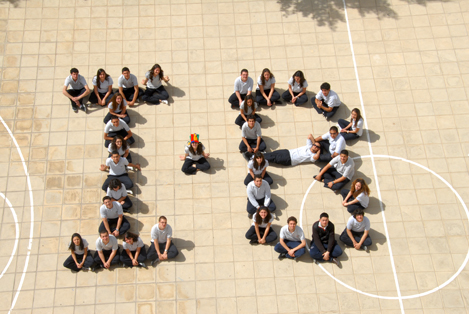George Mason High school has been a national leader and innovator in establishing the International Baccalaureate (IB) Diploma. Recently, the Falls Church City Public School District (FCCPS) has been the first Virginia school district to be recognized as a full-IB school system. Out of the hundreds of thousands of schools in the Americas, only 3,380 offer this program (approximated to be around 1%), and these schools have some of the highest graduation and college attendance rates in the country. However, the arduous requirements of the program have caused many students and administrators to rethink the merits of IB.
Despite the challenging workload and number of tests students must complete to receive credit, the IB diploma develops strong academic, social, and emotional characteristics in students.
“The IB diploma allows students to become very well-rounded, GM’s IB Coordinator Mr. Dan Coast said. “An IB education isn’t about just learning facts and figures and how much we can cram in your brains over two years, it is about teaching kids ways to think.”

“I like the IB Diploma because even though I am required to do a class in a certain group, I can pick which classes I want to take and the level it is at,” junior Meghan Murphy said. “The classes are… certainly challenging but not impossible, so the IB is a very good fit for me as a student. It also allows for creativity but has enough stability and guidelines to keep me grounded.”
However, she also believed that the IB Diploma had its cons.
“I dislike the IB Diploma because of the setbacks of having an international grading system,” Murphy said. “Although there are benefits to having assessments graded by outside professors and having a universal exam, it is hard for all students to do well on the exams because they are not created specifically for that student’s’ school.”
Despite the educational merits, the IB program is known to be particularly exclusive considering relatively few students are able to succeed in it (since last year 43 out of approximately 187 seniors received IB diplomas).
“Any student really has the intellect to be successful in IB. The trick, and why some students have not been successful is time management… I’ve had IB Diploma candidates that were three sport athletes,” Coast said.
When asked to elaborate on student athletes’ success rates in the IB program, Mr. Coast stated that 29 students out of the 43 who received an IB Diploma were athletes.
Another concern with the IB diploma is the amount of money it costs to run, compared to the number of students who are able to succeed in it. According to Mr. Coast, the annual fee for the school to be an authorized IB school is $11,370. One time registration exam fee for each IB student costs $168, with an additional $116 for each exam. That is relatively a high number for only 43 students to be able to succeed in it out of about 187 seniors .
In addition, research suggests that IB students are more likely than their peers to complete an undergraduate degree and pursue graduate work. They are also stronger on leadership skills, tutoring students, working with university faculty on research projects, and taking part in community service. However the most important benefit of the IB Diploma is that it prepares you for college and its rigorous course expectations.
“[It] also allows them to expose themselves to collegiate level thoughts and work prior to going off to college,” Mr. Coast said. “It is a two year program… so we have [students] for two years to scaffold them to what a college experience entails and what is expected of them by college professors.”
With the IB diploma, you can earn college credit if you receive a minimum of 24, an average of four (C’s) on the IB exams taken at the end of the course. Not to mention how much applicants can stand out when colleges see IB courses on their transcript.
“[In] some [overseas] schools, you can’t get into [certain colleges] without an IB diploma or some equivalent that is offered in Europe,” Mr. Coast said. “Here in America, there are schools who recognize that these students are going above and beyond and it certainly is a feather in their cap when they go through the admissions process. College credits are based on exam scores, whether you are talking about IB or AP.”
Some students also wonder if taking AP courses is better than receiving an IB diploma. According to junior Jack West, it is better to sacrifice the IB Diploma to take a combination of classes that would make his studying at Mason enjoyable.
“I only take one AP Course (AP Statistics). I have 3 IB HL’s and 3 IB SL’s but I chose not to do the diploma even though I had everything but a CAS Project and TOK [Theory of Knowledge],” said senior Jack West. “I chose to ditch the IB Diploma because at Mason it is extremely limiting on a student’s course selection.”
Though Coast believes that IB education is superior in directing critical writing and thinking skills into the curriculum more than AP does.
Last year, 43 students (out of 50 IB diploma candidates), received the IB diploma, causing GMHS to hit the worldwide average of 80% success.
“[IB diploma candidates] learn how to read better, to think critically, to write better, and they are taking those skills to college to be more successful” said Mr. Coast.
Overall, even though the IB program is a rigorous one with a plethora of requirements and can be stressful, it is at the same time beneficial. However, if it does not allow you to study what you want to or limits your course selection, then it might not be the best fit for you.










